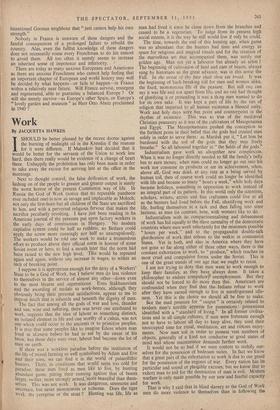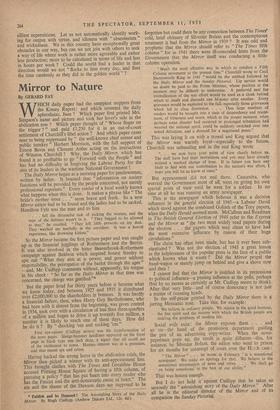Work
By JACQUETTA HAWKES ISHOULD be better pleased by the recent decree against the burning of midnight oil in the Kremlin if the reasons for it were different. If Malenkov had decided that it would be better for the servants of the Union to work less hard, then there really would be evidence of a change of heart there. Unhappily the prohibition has only been made in order to take away the excuse for arriving late at the office in the mornings. Next to thought control, the false deification of work, the lashing on of the people to greater and greater output is surely the worst horror of the present Communist way of life. In Russia the God of Work (notice that no reputable pantheon ever included one) is now as savage and implacable as Moloch; not only the first-born but all children of the State are sacrificed to him, and with a perverted religious fervour that makes the sacrifice peculiarly revolting. I have just been reading in an American journal of the pressure put upon factory workers in the early days of communism in Hungary. No modern capitalist system could be half so ruthless; no Bedaux could apply the screw more cunningly nor half so unscrupulously. The workers would be told one week to make a tremendous effort to produce above their official norm in honour of some Soviet event or hero, to find a month later that the norm hAd been raised to the new high level. This would be repeated again and again, without any increase in wages, to within an inch of breaking point. I suppose it is appropriate enough for the deity of a WOrkers' State to be a God of Work, but I believe men do less violence to themselves in the service of almost any other—down even to the most bizarre and superstitious. Even Stakhanovism and the awarding of medals to work-heroes, although they obviously bring their personal satisfactions, appear to me to impose much that is infantile and beneath the dignity of man. The fact that among all the gods of war and love, thunder and sun, wine and suffering, there was never one attributed to work, suggests that the idea of labour as something distinct, an isolated element in life and one worthy of a cultus, was not one which could occur to the ancients or to primitive peoples. It is true that some peoples like to imagine Edens where man lived in id:eness before he had to eat by the sweat of his brow, but those days were over, labour had become the lot of man on earth. If there was a workless paradise before the institution of the life of mixed farming so well symbolised by Adam and Eve and their sons, we can find it in the world of palaeolithic hunters. There, in conditions that would seem too cold for paradise, these men. lived as men like to live, by hunting abundant game, pitting their cunning against that of beasts larger, swifter, more strongly armed,-more beautiful than them- selves. This was not work. It was dangerous, strenuous and uncertain, but never monotonous or toilsome. Does the tiger Work, the reregrine or the stoat ? Hunting was life, life as man had lived it since he came down from the branches and ceased to be a vegetarian. To judge from its present high social esteem, it is the way he still would live if only he could.
The time, towards the end of this hunting age, when game was so abundant that the hunters had time and energy to spare for religious and magical rituals and for the creation of the marvellous art that accompanied them, was surely our golden age.., Man not yet a labourer but already an artist ! The beginning of cultivation of land and care of beasts, always sung by historians as the great advance, was in this sense the Fall. In the sweat of thy face shalt thou eat bread. It was the beginning of back-breaking toil for men and women alike, the fixed, monotonous life Of the peasant. But still one can say it was life and not apart from life, and no one had thought of glorifying it or pretending it was a thing men wanted to do for its own sake. It was kept a part of life by the ties of religion thht imparted to all human existence a blessed unity. Work and holy days were but point and counterpoint in the rhythm of existence. This was as true of the mediaeval , Christian peasantry as it was of the cultivators of Mesopotamia and Egypt. The Mesopotamians pushed the conception to the furthest point in their belief that the gods had created man solely in order to serve them: as Marduk put it, "Let him be burdened with the toil of the gods that they may freely breathe." So all laboured together in " the fields of the gods.'
Industrialism gave work an altogether new complexion. When it was no longer directly needed to fill the family's belly but to earn money, when man could no longer go out into his work nor consume its products or see its achievement, when, above all, God was dead, at any rate as a being served by human toil, then of course work could no longer be identified with life and became so many " hours a week, while holy days became holidays, something in opposition to work instead of an integral part of its pattern. In this world only the scientists, scholars, writers, artists and fine craftsmen could live at all as the hunters had lived before the Fall, identifying work and life, hurling themselves at a task and then falling into utter laziness, as men (in contrast, here, with women) like to do.
Industrialism with its compartmentalising and debasement of work has led equally to the slave mentality of the democratic countries where men work reluctantly for the minimum possible " hours per week," and to the propagandist double-talk glorification of work that echoes to the welkin in communist States. Yet in both, and also in America where they have not gone so far along either of these other ways, there is the constant exhortation to work, to " produce," which reaches its most cruel and compulsive forms under the Soviet. This is one of the great trends of our age that we ought to resist. I am not trying to deny that men want to work enough to keep their families, as they have always done. It takes a philosopher to endure compulsotl` unemployment. But they should not be forced to do more than this. Americans are confounded when they find that the- Indians refuse to work after they have earned enough to live in unrefrigerated idle- ness. Yet this is the choice we should all be free to make.
Far the mad pressure for " output " is certainly related to modern man's terrible appetite for possessions: possessions identified with a " standard of living." In all former civilisa- tions and in all simple cultures, if men were fortunate enough not to have to labour all day to keep alive, they used their unoccupied time for ritual, meditation, art and riotous enjoy- ments. Now men toil in order to possess vast numbers of objects, generally of a kind not conducive to good states of mind and whose maintenance demands further work.
It would not be so bad if we were content to stultify our- selves for the possession of bedroom suites. In fact we know that a great part of the exhortation to work is due to our greed for the possession of the 'engines of war. Every nation has its particular and sound or plausible excuses, but we know that to exhort man to toil for the destruction of man is evil. Modern warfare is only made possible by our new and fearful capacity for work.
That is why I said that in blind slavery to the God of Work men do more violence to themselves than in following the silliest superstitions. Let us not automatically identify work- ing for output with virtue, and idleness with " absenteeism " and wickedness. We in this country have exceptionally great obstacles in our way, but can we not join with others to seek a way -of life where work is rather more agreeable and rather less productive; more to be calculated in terms of life and less in hours per week ? Could the world find a leader in that direction would we not " flocke to him every day, and fleet the time carelessly as they did in the golden world " ?



































 Previous page
Previous page